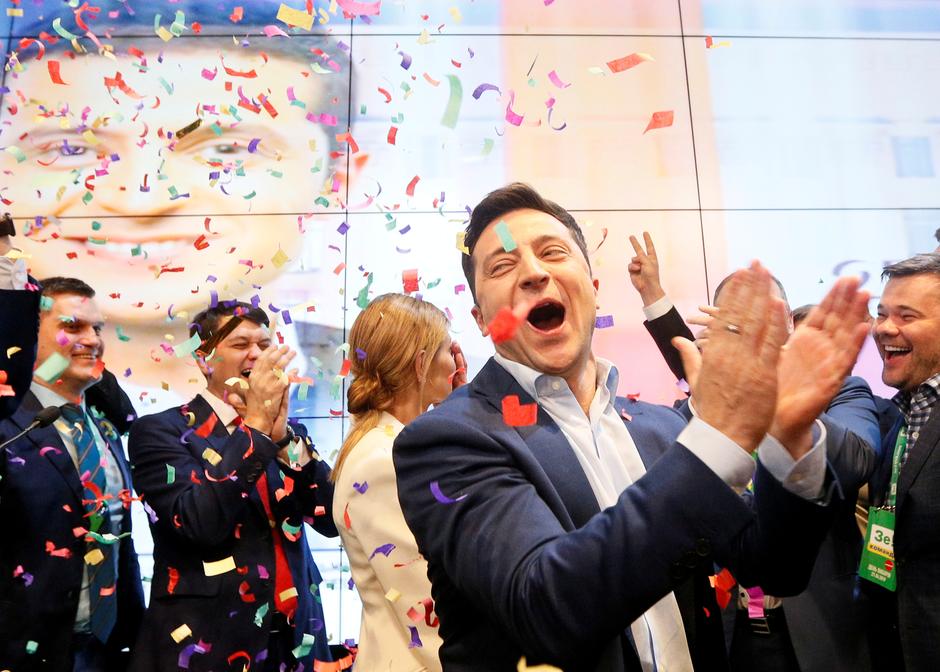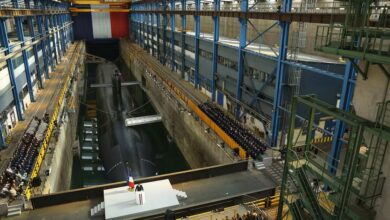
KIEV (Reuters) – Ukraine entered uncharted political waters on Monday after near final results showed a comedian with no political experience and few detailed policies had dramatically up-ended the status quo and won the country’s presidential election by a landslide.
The emphatic victory of Volodymyr Zelenskiy, 41, is a bitter blow for incumbent Petro Poroshenko and presents a riddle for investors, the West and Russia who wonder what approach he will take on everything from Moscow to the domestic banking sector.
Zelenskiy is poised to take leadership of a country on the frontline of the West’s standoff with Russia following Moscow’s annexation of Crimea and support for a pro-Russian insurgency in eastern Ukraine.
Poroshenko, 53, had tried to rally voters, casting himself as a bulwark against Russian aggression and a champion of Ukrainian identity.
But Zelenskiy, best known for playing a fictitious president in a TV show, trounced him, winning 73 percent of the vote, central election commission data showed after 99 percent of votes were counted.
Oleksiy Kondrashov, a public sector utilities worker in Kiev, said the election was not an endorsement of Zelenskiy but a protest vote against Poroshenko whose pledges, such as promising to stamp out corruption, came to nothing.
“Everyone was not voting for Zelenskiy, but against Poroshenko. If someone else had made it to the second round, people would have voted for them instead,” said Kondrashov.
Declaring victory to emotional supporters at his campaign headquarters on Sunday night, Zelenskiy promised he would not let Ukrainian people down.
“I’m not yet officially the president, but as a citizen of Ukraine, I can say to all countries in the post-Soviet Union look at us. Anything is possible!”
Zelenskiy, the latest anti-establishment figure to unseat an incumbent, both in Europe and further afield, has promised to end the war in the eastern Donbass region and to root out corruption amid widespread dismay over rising prices and sliding living standards.
But he has been coy about exactly how he plans to achieve all that and investors want reassurances that he will accelerate reforms needed to attract foreign investment and keep the country in a multi-billion dollar International Monetary Fund program.
“Since there is complete uncertainty about the economic policy of the person who will become president, we simply don’t know what is going to happen and that worries the financial community,” said Serhiy Fursa, an investment banker at Dragon Capital in Kiev.
In a system where parliament calls many of the shots, Zelenskiy could struggle to get lawmakers’ approval for new policies since his own party has no seats and a faction loyal to Poroshenko is the biggest force.
And while Zelenskiy has the right to propose certain cabinet jobs, like that of foreign minister, much of the current government is likely to remain in place until the next parliamentary election which is only due in October.
WEST WATCHING CLOSELY
The United States, the European Union and Russia will be closely watching Zelenskiy’s foreign policy pronouncements to see if and how he might try to end the war against pro-Russian separatists that has killed some 13,000 people.
US President Donald Trump phoned Zelenskiy and pledged to support Ukraine’s territorial integrity, while European Council President Donald Tusk congratulated the Ukrainian people on what he called a show of democratic maturity.
Zelenskiy said on Sunday he planned to continue European-backed talks with Russia on a so far largely unimplemented peace deal and would try to free Ukrainians imprisoned in Russia, including 24 sailors.
Russian Prime Minister Dmitry Medvedev, who only last week signed a decree limiting some Russian energy exports to Ukraine, said Moscow and Kiev had a chance to improve what he called their destroyed economic relationship, but was not harboring any illusions that it would necessarily happen.
Zelenskiy has pledged to keep Ukraine on a pro-Western course while sounding less emphatic than Poroshenko about possible plans for the country of 42 million people to one day join the European Union and NATO.
Critics accuse the president-elect of having an unhealthily close working relationship with powerful oligarch Ihor Kolomoisky, whose TV channel broadcasts his comedy shows.
Zelenskiy has promised not to be unduly influenced by Kolomoisky, but the fate of PrivatBank, Ukraine’s largest lender which was nationalized in 2016, is set to be one of the earliest and most important tests of his pledge.
The government wrested PrivatBank from Kolomoisky as part of a banking system clean-up backed by the IMF. However, a Kiev court ruled last week that the change of ownership was illegal.
Zelenskiy has repeatedly denied he would seek to hand PrivatBank back to Kolomoisky if elected or help the businessman win compensation for the ownership change.
The IMF will be watching closely too to see if Zelenskiy will allow gas prices to rise to market levels, another demand of the fund’s but a politically sensitive issue and one Zelenskiy has been vague about.
(Election graphic – tmsnrt.rs/2EEQ22R)
By Andrew Osborn, Matthias Williams. Additional Reporting by Pavel Polityuk, Natalia Zinets, Andrei Makhovsky, Polina Ivanova and Margaryta Chornokondratenko; in Kiev, by Steve Holland in Washington and by Foo Yun Chee in Brussels; Writing by Andrew Osborn; Editing by Marguerita Choy, Michael Perry and Kirsten Donovan




